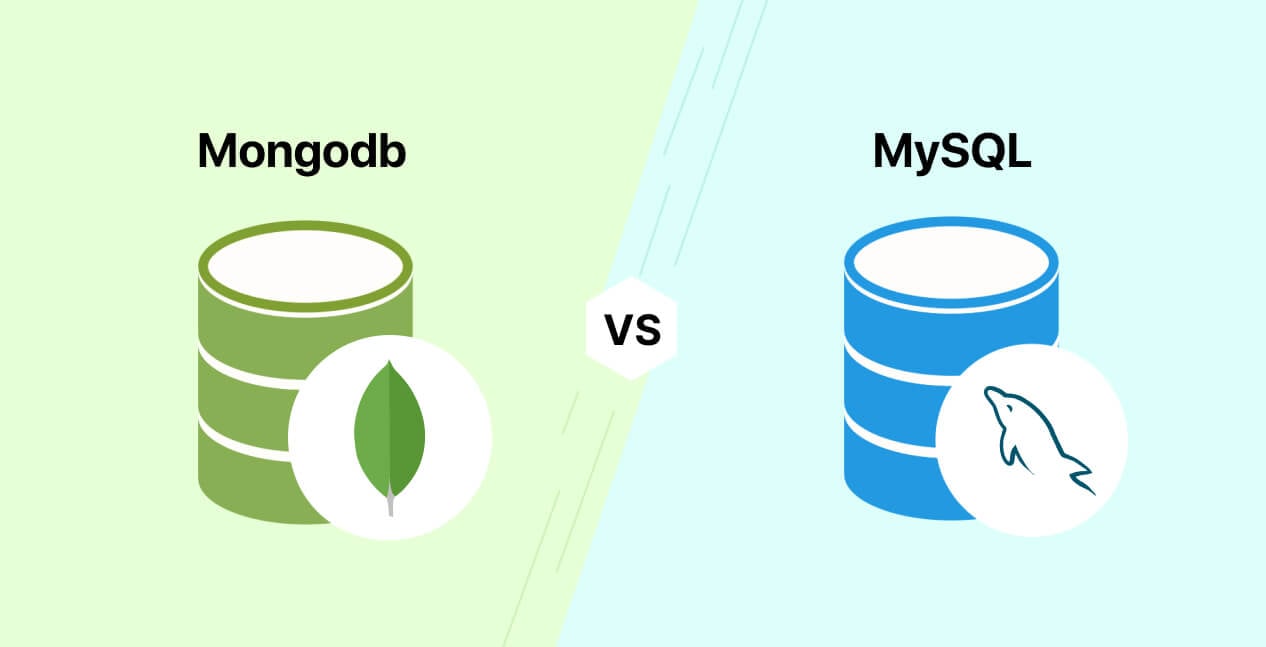-
MongoDB vs MySQL - Introduction
-
What is MongoDB?
- Features of MongoDB
-
Why use MongoDB?
-
When to use MongoDB?
-
What is MySQL?
- Features of MySQL
-
Why use MySQL?
-
When to use MySQL?
- MongoDB vs MySQL: Advantages
- MongoDB vs MySQL: Disadvantages
- MySQL vs MongoDB: Use Cases
-
MongoDB vs MySQL: What are the Main Differences?
- 1. Architecture
- 2. Data Storage Format
- 3. Query language
- 4. Performance and speed
- 5. Security Model
- 6. Scalability
- 7. Ease of Use
- 8. Full-text Search Availability
- 9. Data Replication
- 10. Index Optimization
- 11. Native Language Drivers
- 12. Community Support and Deployments
- 13. Market Share and Popularity
-
MySQL vs MongoDB: Head-to-Head Comparison
-
MongoDB vs MySQL: Which One to Choose
-
MongoDB vs MySQL: Final Words
- FAQs: MySQL vs MongoDB
MongoDB vs MySQL – Introduction
Whenever it comes to software development, the choice of a database system plays a pivotal role. MongoDB vs MySQL are the two most popular open-source database systems. Both store data in a JSON-like format, but they have very different features and designs. MongoDB is a document-oriented database, which means it stores and retrieves data in the form of documents. MySQL is an open-source relational database management system (RDBMS). MySQL has gained popularity due to its ease to use, scalability, security features, and performance. Here’s an overview of what makes each database different and how they can be used together. Without much ado, let’s explore MongoDB vs MySQL.
What is MongoDB?
MongoDB is a free and open-source software database written in C++. MongoDB, Inc. originally developed it as an extension of the MongoMapper Java driver for the MongoDB document-oriented database. MongoDB is a leading open-source database focusing on scalability, availability, and speed. MongoDB is an easy-to-use, flexible, document-oriented database for storing and querying large datasets.
It’s used in retail, manufacturing, web analytics, and IoT applications. MongoDB uses a document-oriented storage engine, storing data as documents instead of rows and columns like SQL databases. Documents in MongoDB are JSON-like objects that can contain any mixed type of data, including arrays, objects, dates, strings, and numbers. In addition to storing documents, it also supports embedded documents which are direct child nodes of other documents.
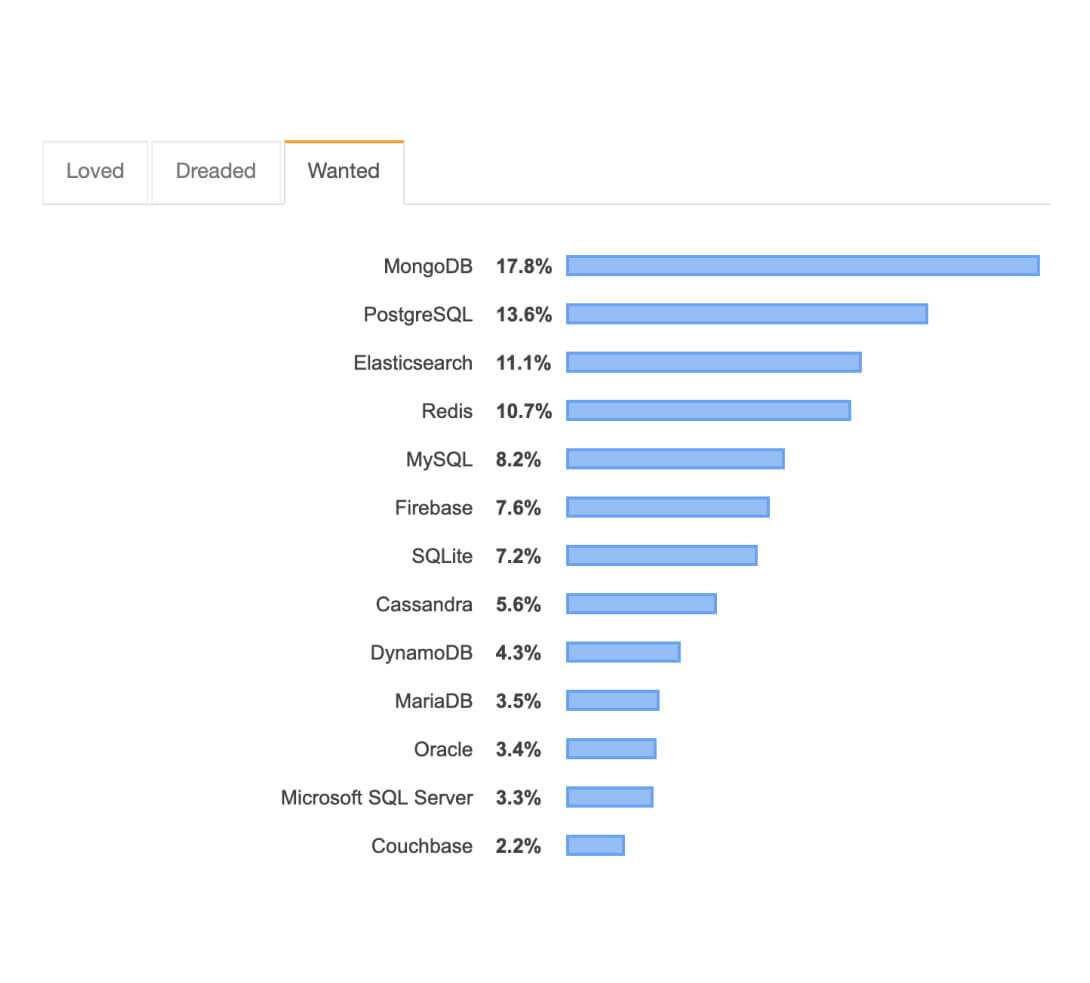
Source: MongoDB
Features of MongoDB
Can handle huge amounts of data
MongoDB can handle vast amounts of data. It can take more data than the largest relational databases on the market today. MongoDB was created by engineers from companies like eBay, Mozilla, and Craigslist who needed a better way to store their growing amounts of data at scale.
Highly Scalable
With MongoDB, you can quickly scale your application by adding more machines or increasing the amount of memory per machine you have running. You can also work with remote instances through the cloud or run your install on your local machine.
Document-oriented Database
MongoDB is a document-oriented database that stores data in JSON-like documents. MongoDB provides fast access to structured data while embracing the MVCC (multi-version concurrency control) model, allowing it to grow with your application and scale out automatically.
Flexible & Dynamic Database
MongoDB’s primary key-value store architecture makes it easy to use and scale. The database’s flexibility allows you to easily store any kind of data, including JSON documents with dynamic fields. You can also write complex queries in JavaScript or other dynamic languages that can’t be done with other popular databases like MySQL or PostgreSQL.
Why use MongoDB?
MongoDB is a relational database that stores JSON-formatted documents as its primary data storage mechanism. MongoDB has been designed to handle large amounts of data with very high performance, allowing you to store and query JSON documents regardless of the size or complexity of your data.
MongoDB is an excellent choice for developers because it’s a NoSQL database that supports many of the same features as its relational counterparts. As MongoDB focuses on agility and scalability, hire MongoDB developers who can make it well-suited for applications with high traffic volumes and large data sets. The platform uses JSON documents as its primary storage mechanism.
When to use MongoDB?
MongoDB is a popular NoSQL database built from the ground up to be easy to scale and affordable. MongoDB is just like the other NoSQL databases, except that it’s written in JavaScript and runs on the web. MongoDB’s primary focus is on data-driven applications, so it has no query language or support for SQL-style queries. It also doesn’t provide joins or aggregates, but you can use aggregation functions in JavaScript.
With MongoDB development company beside you, you can store different types of data in one database. Documents in MongoDB can have multiple fields, including text, numbers, and arrays (listing all values in an array). The collection field lets you organize your data into collections (or folders), which can then be stored in different databases or files.

What is MySQL?
MySQL is a popular open-source database management system (DBMS). It is an acronym for the project’s original name, MySQL AB, and it is a registered trademark of Oracle Corporation.
MySQL has been implemented in many operating systems and programming languages, but it is primarily associated with Linux, one of the first to include it. Many popular web server applications such as Apache and Nginx use MySQL as their database engine.
MySQL can be used to store data in a single file or spread across multiple files. The file format used by MySQL allows you to easily read and modify data without having to worry about losing your chances if you accidentally overwrite a file while editing it.
Features of MySQL
High Performance & Scalability
MySQL’s primary focus is high performance, reliability, and ease of use. It is suitable for applications that require scalability and durability in high-volume environments where data integrity must be maintained through replication and automatic failover.
Open-source Database
MySQL is a relational database management system (RDBMS). It is a multi-user, multi-threaded, highly available open-source database server. MySQL was originally developed by the Swedish company MySQL AB and later acquired by Oracle Corporation in 2004. The resulting product is now known as Oracle’s MariaDB.
Better Support & Availability
MySQL provides many features in larger RDBMS systems, such as high availability, replication, and support for hierarchical data. MySQL provides more advanced features such as stored procedures, triggers, views, and user-defined types.
Highly Portable
MySQL has been ported to many operating systems and is used by millions of websites. It is also widely used in enterprise applications, competing with commercial databases such as Oracle’s Database Enterprise Edition and Microsoft’s SQL Server.
Why use MySQL?
It is an accessible, open-source database server that has several uses, including being used as a web server, application server, and data storage. MySQL is also MariaDB, but the name has been changed to avoid confusion with Oracle’s MariaDB database software. It stores data in tables organized into rows and fields; the rows are linked together using foreign keys. Each row contains references to other rows in the same table or different tables in the same database.
MySQL provides the ability for multiple users to access the same database simultaneously. This is particularly useful in companies that have separate databases for different departments or departments within the same company. Using different versions of MySQL on the same server is also beneficial when there are additional requirements between one department and another. Some other products may not allow this level of flexibility. So if you think MySQL is the best fit for you, then a MySQL Database Development Company can make things easier for you and hlep you in adapting this database.
When to use MySQL?
The full version can be used where other databases are required, such as data analysis and transaction processing systems, enterprise resource planning (ERP) systems, business intelligence (BI), extensive data management, etc., and e-commerce sites. It has a variety of users because it is very flexible and easy to use while achieving a high level of performance. MySQL has certain features that make it suitable for large-scale data sets: It supports a wide range of data types, and its ability to scale up or down dynamically makes it ideal for analyzing large amounts of data.
MongoDB vs MySQL: Advantages
Advantages of MongoDB
- MongoDB is a document database that stores data as key-value pairs. Each record consists of one or more fields.
- MongoDB’s query language is flexible and powerful because it lets you specify how the fields are joined together when you run a query.
- The design of the MongoDB database allows it to store large amounts of data with ease and speed, making it an excellent choice for applications that require high levels of scalability.
- The most significant advantage of MongoDB over other databases is its ability to scale out.
- If you have more servers than your system can handle, you can add new servers and increase capacity without affecting performance.
Advantages of MySQL
- MySQL is an RDBMS (Relational Database Management System), which means it stores data in tables with rows that contain multiple columns.
- MySQL has special functions for joining various columns into one value and creating indexes so that queries can be run quickly.
- MySQL allows you to create multiple databases within one server and then associate different tables with different databases. Each database has its tables and can be used for various purposes.
- You can also change the name of any table or database in your system anytime without affecting other users’ access.

MongoDB vs MySQL: Disadvantages
Disadvantages of using MongoDB
- It’s not a relational database. It’s an object-oriented schema that stores JSON data in collections.
- It’s not ACID compliant, which means it isn’t crash-safe and can lose data when something goes wrong (as in a power outage). This is why you need to run it on a separate server with redundancy.
- MongoDB has no support for SQL transactions and transactions at all, which can lead to very slow queries if you use them often enough.
- There’s no indexing or querying built into MongoDB, so if you want to do advanced work with your data, you have to create your indexes and query structures which can be tricky!
Disadvantages of using MySQL
- MySQL is a prolonged database server; if you have a lot of data to handle, it will take a long time to process.
- If you use too complex queries, they can also take longer to execute.
- SQL syntax errors can cause data corruption in your table, affecting all the records in your table.
- The integrity issues can be caused by multiple reasons like incorrect syntax or even bugs in the software. These issues may lead to loss of data or even corruption of critical records in your database.
- Database size limits are imposed by different organizations so that they don’t have to purchase extra hardware resources just because their databases have exceeded their storage capacity limits.
MySQL vs MongoDB: Use Cases
Here are the most popular uses of MongoDB & MySQL:
Use cases for MongoDB
MongoDB is a NoSQL database that stores data in JSON-like documents. MongoDB is one of the most popular databases used for web applications. Here are some famous use cases for MongoDB:
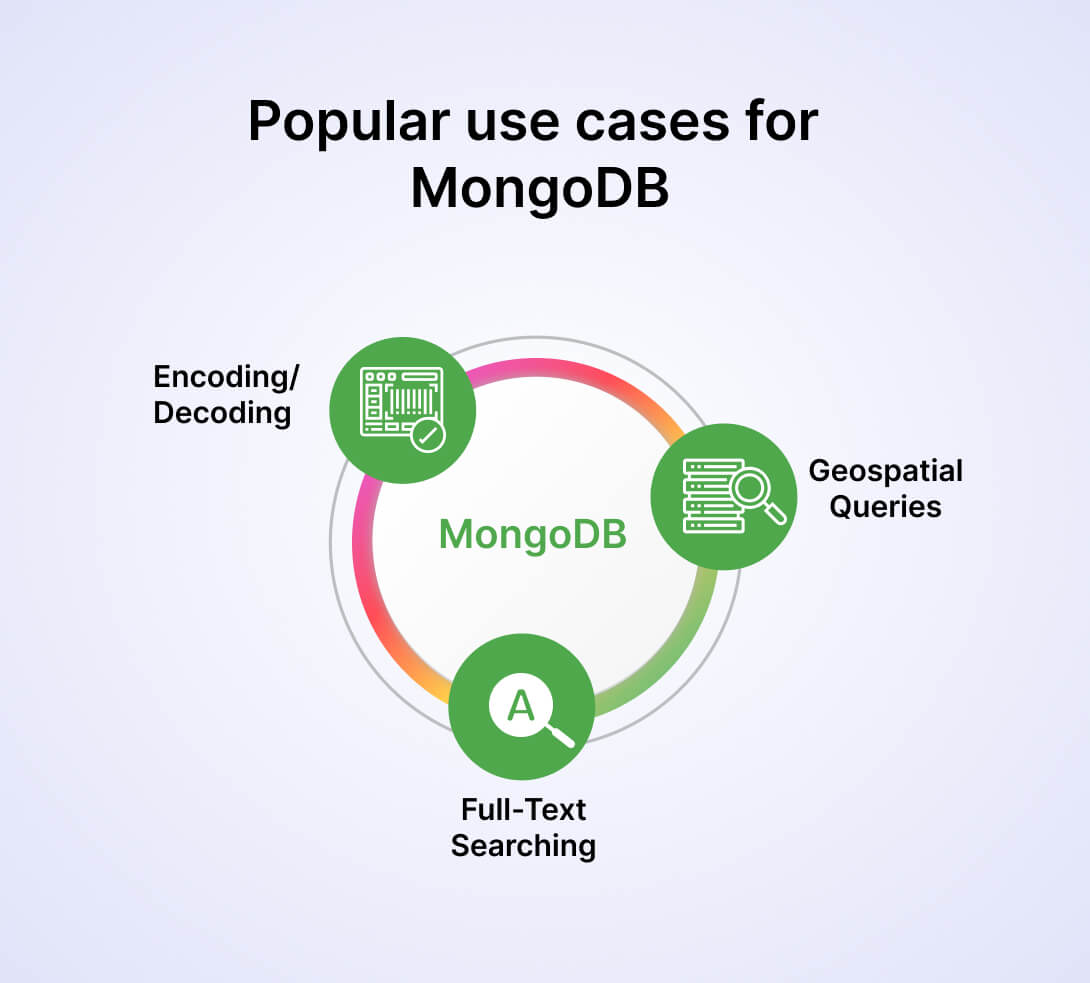
Encoding/Decoding
MongoDB relates text strings to each other using 64-bit integers, called BSON objects, which can be encoded or decoded with the help of a simple command line tool. This feature makes it easy to insert data into MongoDB and retrieve it.
Full-Text Searching
Full-text search allows you to search through all documents within a collection in any field you want. This feature helps you find information more quickly and efficiently than traditional searches on just one area, such as the title or author of a document.
Geospatial Queries
Geospatial queries allow you to query MongoDB remotely over the internet, even if your database isn’t running at that moment on your computer. You can also store geospatial data in MongoDB so that when you need it later, it will be available no matter where your application runs.
Use cases for MySQL
MySQL is a leading open-source database system. Database technology is used by millions of people in various industries and organizations worldwide. Here are some famous use cases for MySQL:
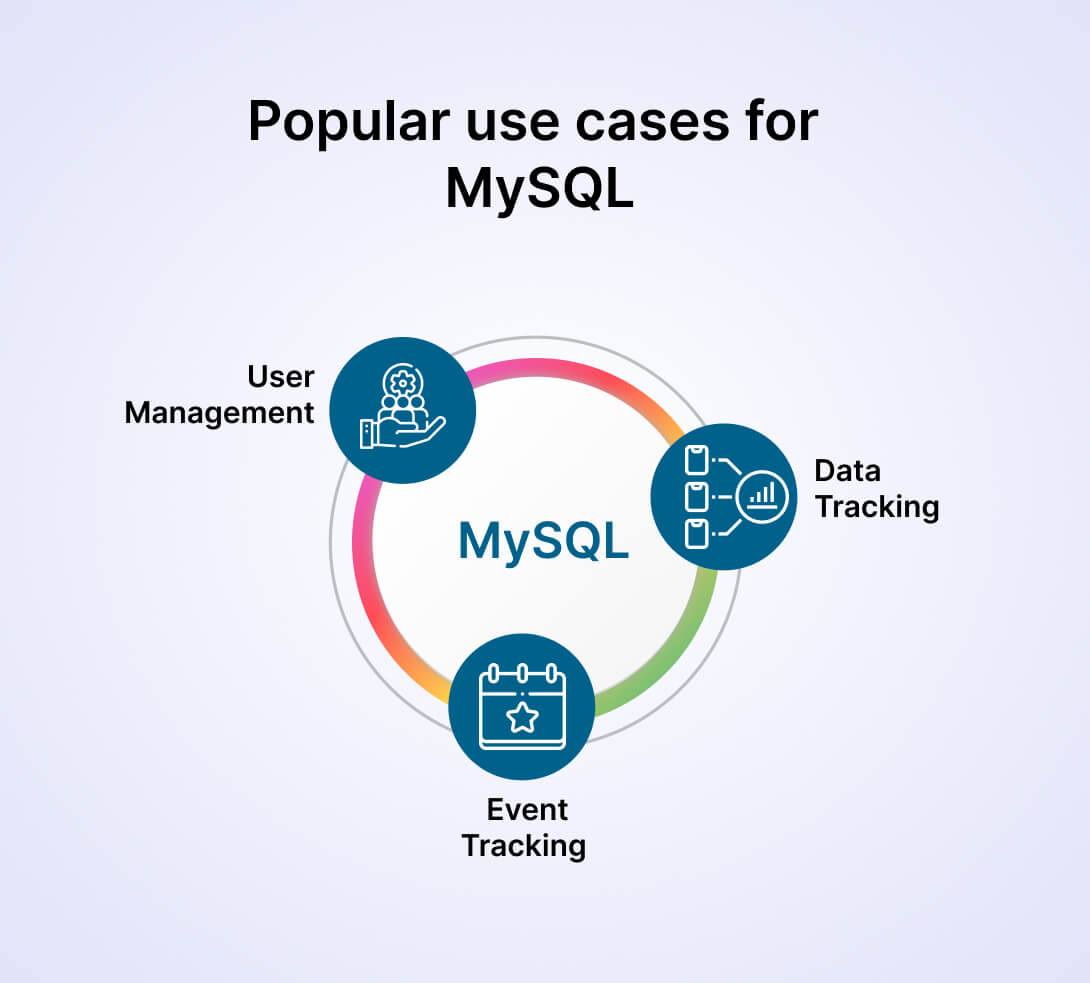
User Management
Websites often have user management systems where users can be registered and managed. With a user management system, you can easily create an account or add new accounts to your website without worrying about user authentication issues or losing data if a website crashes. You can also use MySQL’s built-in security features to ensure that only authorized users can access the data.
Data Tracking
Many businesses track their sales, orders, and other essential metrics using databases like MySQL. This allows them to improve their business processes and analyze trends in real-time to react when something goes wrong with their operation. A data tracking system will enable you to monitor your business operations in real time and ensure that everything runs smoothly.
Event Tracking
The same goes for event tracking systems; they allow you to monitor events such as new customers signing up for your service, orders being placed, and other important information related to your business operations. This helps you identify areas where you need improvement.
MongoDB vs MySQL: What are the Main Differences?
Let’s examine other differences between MySQL and MongoDB regarding the following attributes:
1. Architecture
MongoDB is a document-oriented database, while MySQL is a relational database management system. Document databases store documents as collections of key/value pairs. Documents can be nested within one another without limit on the depth of nesting. The key/value pair is stored in an object called a JSONB field, which is also known as a BSON (binary JSON) document. In contrast, MySQL stores data as rows with columns.
2. Data Storage Format
MongoDB uses BSON format for storing key/value pairs, whereas MySQL uses JSON format for storing key/value pairs. The latter format allows developers to use SQL-like queries such as WHERE clause and JOIN operations without worrying about converting them back into BSON format before performing the query operation. MongoDB stores data in objects that are arranged in collections. Each collection is a separate unit of persisted data. Exhibitions can be organized in any way you want, but MongoDB provides an easy mechanism for grouping related documents based on their attributes.
3. Query language
MongoDB and MySQL have different query languages. MongoDB uses an expressive SQL-like syntax, while MySQL uses a more traditional syntax. MongoDB and MySQL are both relational databases, but they have different goals. MySQL is a general-purpose database that can be used for any application. MongoDB is a document database that excels at storing and retrieving large volumes of unstructured data.
4. Performance and speed
MongoDB is a document-oriented database that stores information in JSON-like documents. The database engine can store data in flat files, and indexes can be used to speed up queries. MongoDB supports high throughputs using a replica set (also known as a shard set) were a separate machine processes each shard. This way, you can run your database on low-end hardware without affecting performance. It has more concurrency support, which means that it can handle more simultaneous connections to your database, which means that when you have more users connecting at once, your queries will run faster.
On the other hand, MySQL is a relational database that stores data in rows and columns, making it slower than MongoDB when dealing with large datasets. For example, if you have a million rows in your MySQL table and want to find all the records with the value ‘Awesome’, it would take about 21 seconds on MySQL. With MongoDB, it would take about 14 seconds.
5. Security Model
MongoDB has a very different security model compared to MySQL. While you can create users and assign permissions as needed in most cases with MySQL, MongoDB only supports role-based access control. For example, you can create an admin user to manage your database and grant that user the ability to create, modify and drop databases. However, this will not allow them access to all aspects of your data. Also, if you want to change your schema, later on, it’s currently impossible with MongoDB since there are no triggers or other built-in tools for changing schemas.
6. Scalability
MongoDB is a NoSQL database, which means it doesn’t use SQL. Instead, MongoDB uses the JSON-like BSON format to store and query data. This makes it possible to scale vertically without worrying about scaling out or down. MongoDB is designed for high-volume, high-performance applications where write-heavy operations are expected.
This makes it a good fit for applications that require many reads from the same data source and updates to large volumes of data, such as social networking sites. MySQL is more scalable than MongoDB in terms of performance and availability, but it’s not designed for high-volume applications. Many organizations use it as their primary database because it’s simple to set up and manage.
7. Ease of Use
MongoDB uses an inverted index for fast lookups and provides strong authentication using user accounts and passwords. In contrast, MySQL uses an SQL-like syntax for queries but has no built-in authentication features. In addition, MongoDB has built-in replication capabilities that allow users to quickly scale out their applications across multiple servers without having to write complex code or manage complex setups.
8. Full-text Search Availability
MongoDB’s built-in full-text search capability makes searching for specific terms in large amounts of data incredibly easy. Compared to MySQL’s support for full-text search through Sphinx, this makes MongoDB an easy choice for anyone looking for a flexible tool that can easily handle massive amounts of data. MongoDB provides a built-in replication feature that allows you to replicate your database across multiple servers to ensure your data will always be available as long as necessary. This feature is not available in MySQL Community Server or MariaDB Community Server.
9. Data Replication
MongoDB supports asynchronous replication, which can replicate data in the background. This allows for fast updates without waiting for all the data to be repeated. It also means that you don’t have to worry about taking down your site if one of your nodes goes down. With MySQL, you are responsible for replicating your data across multiple servers to ensure that all of your data is available at any given time.
MongoDB has built-in sharding capabilities, allowing scalable collections with no replication lag. MongoDB’s replication system is known as replica sets, where each group contains several replicas distributed across the cluster to ensure high availability.
10. Index Optimization
MongoDB has no indexes. It relies on the B-tree index structure to store data. However, MySQL has a very efficient binary tree index structure that can be used for specific queries. MongoDB also does not support full-text search, which MySQL supports very well. The MongoDB query language (BSON) is optimized for efficiently querying large amounts of data.
This makes indexing and searching faster than with MySQL because BSON was designed from the ground up around this purpose. MySQL’s binary format optimizes indexing and searching smaller datasets much more efficiently than BSON. It can be used on more significant amounts of data because it uses a fixed-size encoding scheme instead of an optimized one like BSON.
11. Native Language Drivers
MongoDB’s drivers for various programming languages are written in C++, whereas MySQL’s are written in C/C++ and Java. This has several advantages, limitations, and implications for performance and cost of ownership. MongoDB provides a simple API compared to MySQL, where you have to use complex SQL statements to access your data; however, its high performance and scalability make it an excellent choice for high-traffic applications.
12. Community Support and Deployments
MongoDB is the community’s favorite database, and the company behind it (MongoDB Inc.) has a history of supporting open source projects, especially those used by many people. MySQL does not have this support, though it does provide some support for enterprise customers. The community has actively supported MongoDB since its inception.
This user group provides an excellent channel for people to ask questions, share knowledge and collaborate with others using MongoDB. The community also helps with deployments of MongoDB by delivering open source plugins like expect-mongo that make it easy to write tests and deploy code on top of the database.
13. Market Share and Popularity
MongoDB supports various programming languages and development frameworks, such as Java and JavaScript. It can be used with other NoSQL and traditional SQL databases like MySQL or Oracle.
MongoDB is available as a commercial product, but it’s also free and open-source software. The Free Software Foundation promotes FOSS projects that adhere to certain principles designed to ensure their openness, such as using licenses that allow users to share them freely or making them available at no cost to users who need them.
MySQL vs MongoDB: Head-to-Head Comparison
MySQL vs. MongoDB is the two databases often used in Web development and database management. It is designed to be easy to scale horizontally, so your application doesn’t require extra hardware or software to handle more traffic. The database is built on top of the JavaScript Object Notation (JSON) standard, which can easily be integrated into any application or framework. The MySQL community is very active, and many tools are available to help you get started quickly with MySQL. In contrast, there is no official support for MongoDB in Linux distributions.
| Parameter | MongoDB | MySQL |
| Released in | 2009 | 1995 |
| Founders | Eliot Horowitz, Kevin P. Ryan, Dwight Merriman | Michael Widenius, David Axmark, Allan Larsson |
| Definition | NoSQL Database | Open-source Relational Database |
| Benefit | JSON-based unstructured queries | Uses SQL fixed schemas |
| Usage | CMS, IoT, Mobile, Real-time analytics | Legacy systems such as banking |
| Storage structure | JSON-like documents | Tables using SQL |
| Schema | Dynamic | Static |
| Risk | Least at risk due to design | SQL injection attack risk |
| Scaling | Horizontal | Vertical |
| Who are using it | Sony, Twitter, Hootsuite, Foursquare, InVision, SurveyMonkey | YouTube, Netflix, Walmart, NASA, Spotify, PayPal |
MongoDB vs MySQL: Which One to Choose
MongoDB and MySQL are two of the most popular databases in use today. Both are open source, meaning anyone can download and use them for free. The main difference between the two is that MongoDB is a document-oriented database while MySQL is an SQL-based database.
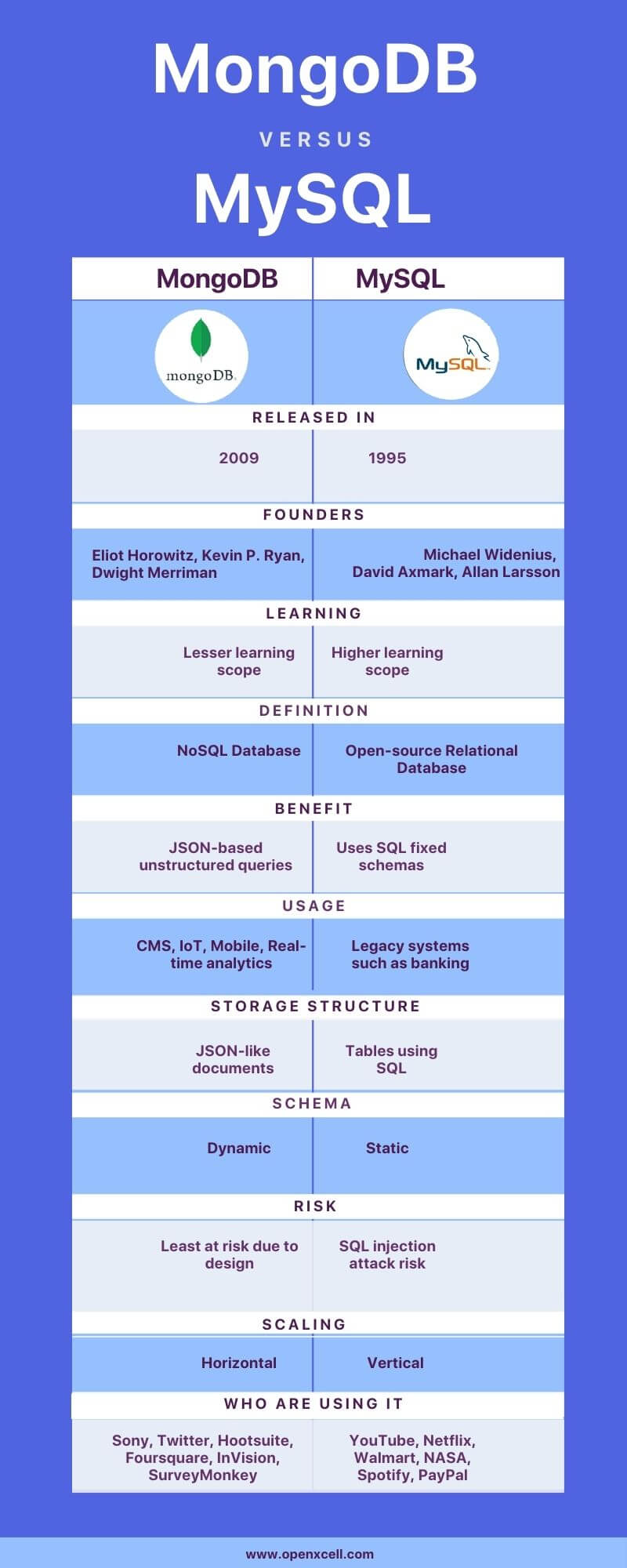
MongoDB is a document-oriented NoSQL database, meaning that you store your data in documents instead of tables. Each record has precisely one field, which can be any data type. The advantage of using MongoDB over relational databases like MySQL or Oracle is that it scales better than these traditional databases because it uses less space on disk and fewer resources when processing queries. You don’t have to worry about security issues when updating records in your database because there aren’t any locks involved, at least not as far as you’re concerned!
Everything said, the final choice of database totally depends upon the kind of business, or type of solution to be developed and the database development company that you choose. You need to check on the expertise, experience, and services provided to ensure that they suggest you the atpt database for your business.
MongoDB vs MySQL: Final Words
When a business needs to store and manage large amounts of data, choosing the best technology for the job is essential. By comparison, MongoDB vs MySQL are both open-source databases that can be used for storing and managing data. However, some critical differences between these two technologies should be considered when choosing one over the other. MongoDB is a document-oriented, NoSQL database that supports JSON documents and schemas. This means it can store any structured or unstructured data in its native format without needing to convert it into another format, such as JSON. So, choose a software development company that can offer you a clear understanding of the database that suits your business.

FAQs: MySQL vs MongoDB
Why is using MongoDB better than using MySQL?
MongoDB is a document-oriented database that supports JSON documents. It’s not just about storing data but also retrieving and working with it efficiently. MongoDB is faster than MySQL. It helps a faster storage engine, which means your data will be retrieved faster. Additionally, it has a flexible schema and can work with JSON documents.
Is MongoDB faster than MySQL?
Yes, MongoDB is faster than MySQL. Regarding performance, MySQL is more immediate than MongoDB because it has been around longer. However, if you need speed, you should use a NoSQL database like MongoDB instead of a relational database like MySQL. This will allow you to store more data in less time because they don’t have to go through a query process to find that one piece of information.
Does MySQL support JSON documents?
MySQL supports JSON documents, but it is not a recommended way to store data. It is an option, though, and can be used if you find a use case. However, it would help if you used prepared statements with MySQL as these databases don’t support out-of-the-box JSON support. You can use MySQL for scrapping data into JSON format.
How do MongoDB and MySQL perform in terms of security?
MongoDB is less secure than MySQL, but it has better performance. MongoDB has no authentication mechanism, so it’s easy for attackers to access your database and perform reconnaissance operations such as discovering credentials for other users or applications. This makes MongoDB an unsuitable choice for applications requiring high-security levels or needing access from a single machine only.
Can MongoDB replace MySQL?
MongoDB does have some advantages over MySQL, but there are also some downsides to using it instead of MySQL. MongoDB and MySQL are different databases. They are complementary, with MongoDB being a more flexible and dynamic database than MySQL. For example, MongoDB does not support transactions and does not have support for foreign keys or relationships between tables. This can make it difficult for specific applications requiring these features.
Should I Use MySQL or MongoDB?
It depends on your application’s requirements. If you need to store large amounts of data that can be easily queried and updated by end users, then you should use a NoSQL database like MongoDB. However, if your application requires data validation and precision, you should use a relational database like MySQL.
Can MongoDB be used for transactional applications?
Yes, MongoDB can be used for transactional applications. It is one of the most popular databases for this purpose. MongoDB stores data in a document-oriented way, storing each record as a single object with a defined schema. This makes it easier to scale and maintain transactional applications because you do not have to worry about maintaining multiple versions of your database or synchronizing data between them.


